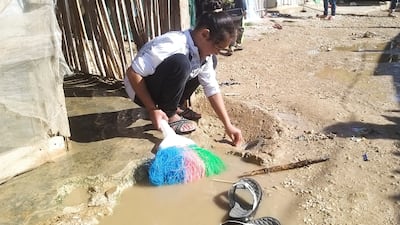Lebanon has reported its first cholera cases in almost three decades in Akkar, an impoverished region in the north that borders Syria.
Lebanon announced the first case on Thursday. The patient, a man from Syria, is in a stable condition and receiving treatment in hospital, the Ministry of Health said.
On Friday, Lebanon's caretaker health minister confirmed another case in Akkar. “There are several other suspected cases,” Firass Abiad said. “Cholera is an illness that is easily transmissible.”
It comes as neighbouring Syria grapples with an outbreak of cholera that has already killed at least 39 people.
"We do not have a confirmed link to the outbreak in Syria, though it is very probable," a ministry source told The National on Thursday night.
Dr Abiad has held a meeting with health officials and representatives from the Ministry of Water and Energy about the issue and a crisis cell has been formed to respond.
He said the Lebanese government had been working with the UN and World Health Organisation to prepare the country for a possible outbreak.
“We're making sure that there is safe water and a good sewage system,” he said.
Samples will be collected from sewage in all Lebanese governorates to test for cholera. The government also plans to secure vaccines and medicines, and brief hospitals and medical centres on symptoms of the disease.
The UN has said it is alarmed over the worsening cholera outbreak in Syria, the first in the country in more than a decade.
More than 10,000 suspected cases have been reported across the country in the past six weeks alone, the World Health Organisation said on Wednesday.
Little has been done to stop the spread of the disease, with much of Syria's infrastructure is severely affected by more than a decade of war, including two thirds of its water treatment plants.
The source of the latest outbreak is believed to be the Euphrates River, which has been contaminated by sewage.
More than five million Syrians rely on the Euphrates for their drinking water, the UN said.
Lebanon itself is undergoing a severe economic collapse, which first became apparent in 2019, and it has plunged much of the population into poverty.
There are severe shortages of clean water, electricity and medicines, adding to the problems that hospitals and medical workers already face.

